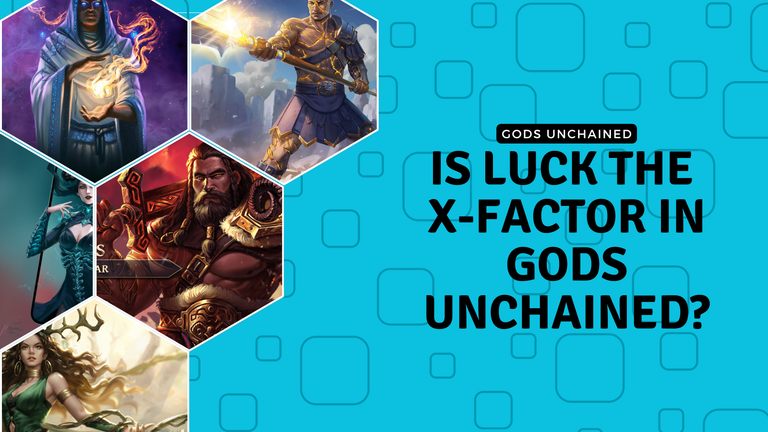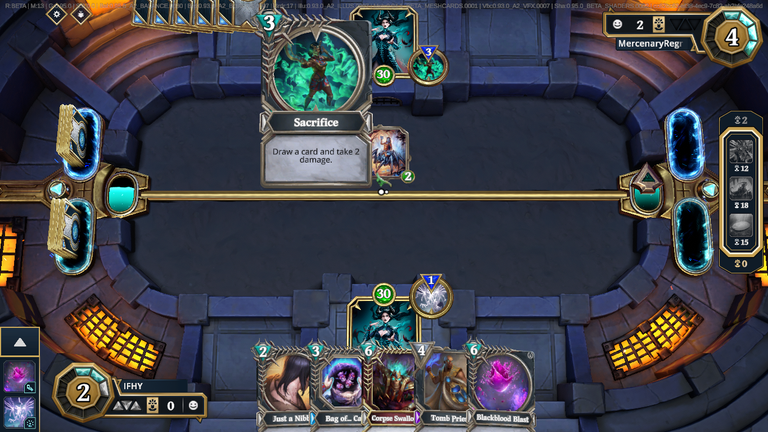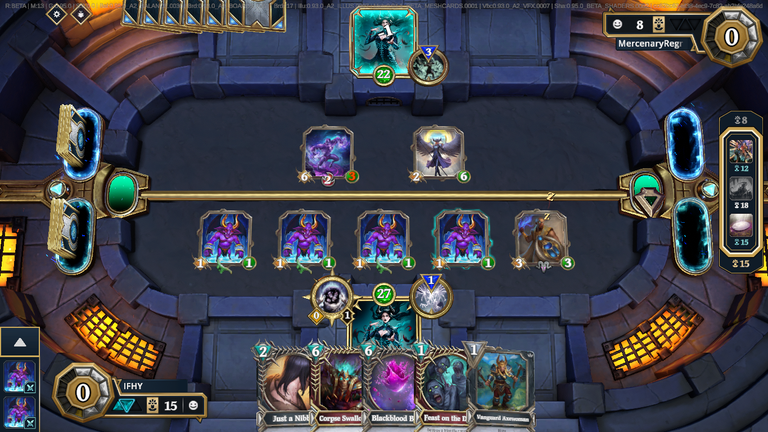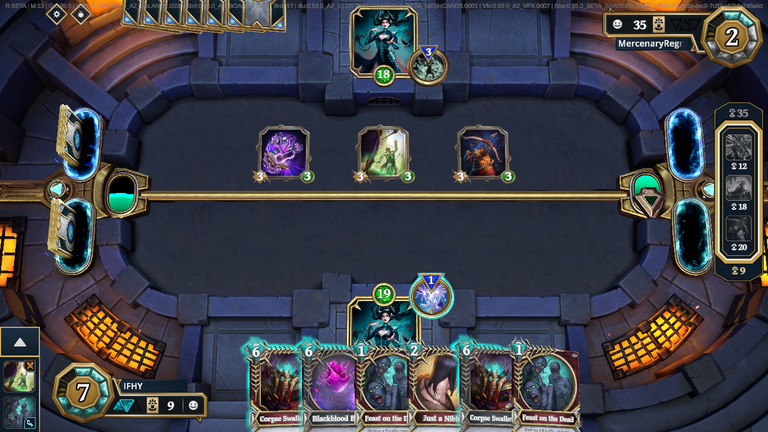Gods Unchained: Is luck the X-factor in Gods Unchained? [EN/PT]

📝 English Version
Greetings.
Does luck influence these games a lot?
Card games like Gods Unchained, Splinterlands, Magic: The Gathering, bring an intriguing mix of strategy and luck.
I've always been an enthusiast of this type of game, mainly due to the complexity involved in creating decks and the need to predict the opponent's moves. Of course, as long as it doesn't become too boring and IDLE like what's happening with Splinterlands.
However, in a recent match, I had an experience that made me reflect on how luck plays a crucial role, sometimes even more than the strategy itself, and how that can shape the entire course of the game.
I was playing a match today, and both my opponent and I had chosen the Death Deck, one of the most interesting ones in my opinion for learning how to play, as it combines abilities to sacrifice creatures with the god's life regeneration and devastating field control effects. I knew it would be a balanced battle, but the truth is that luck was not on my side this time, and that became clear right from the early turns.

Look, 4 ability cards, not to mention the high mana cost monsters.
From the beginning, I realized the battle would favor my opponent. We were both using similar strategies, based on Anubians and spells that generate powerful side effects. My opponent, however, had what many would call luck in their deck.
At the start, they managed to draw some creatures with a high mana cost, which would normally be a drawback. Creatures that require a lot of mana can be slow and difficult to place on the field in the early turns, but once activated, they have the potential to dominate the game. With that, they started putting pressure on my frontline while I patiently waited for something that never came.
Where were my creatures?

The only major offensive I managed was exactly what's shown above in the image, 1/1 Implings.
While my opponent built a solid frontline, I was struck by misfortune. Instead of useful monsters or creatures to directly counter the threats, I was flooded with spells and relics, as if fate were toying with me. As powerful as these cards are, they couldn't create a solid defense against the army forming on the other side.
They simply directed their attacks at my God.
One of the spells I had in hand was the famous Just a Nibble, which allowed me to sacrifice monsters to heal my God, a useful ability in many situations. However, without strong enough creatures to maintain a frontline, I ended up using it defensively, sacrificing anything I could to prolong my survival.
It was a strategy that made me seem desperate, but it was the only choice bad luck had left me.

This match made me reflect on how important the element of luck is in card games like Gods Unchained.
Even with a solid strategy and a well-built deck, you're always one roulette spin away from what the deck has to offer. It's almost a reminder that no matter how skilled a player is, luck still plays a fundamental role.
And so, I continue playing and learning. In the end, either you have good luck, or bad.


About the Author
A Web3 Gaming enthusiast. He dedicates a bit of his time to Play-to-Earn games and the ecosystem they integrate. A weekly author, posting various content related to this through the Hive Blockchain. If you are not yet part of this, consider registering through my Referral Link to follow all the content I share here.
📝 Versão em Português
Saudações.
A sorte influencia bastante nesses jogos?
Os jogos de cartas como Gods Unchained, Splinterlands, Magic: The Gathering, trazem uma mistura intrigante de estratégia e sorte.
Eu sempre fui um entusiasta desse tipo de jogo, principalmente por conta da complexidade envolvida na criação de decks e na necessidade de prever os movimentos do adversário. É claro desde que não se torne tão chato e IDLE como esta acontecendo em Splinterlands.
No entanto, em uma partida recente, tive uma experiência que me fez refletir sobre como a sorte desempenha um papel crucial, às vezes até mais do que a própria estratégia, e como isso pode moldar todo o desenrolar do jogo.
Estava jogando uma partida hoje, e tanto eu quanto meu oponente tínhamos escolhido o Deck de Morte, um dos mais interessantes na minha opinião para se aprender a jogar, pois combina habilidades de sacrificar criaturas com a regeneração de vida do deus e efeitos devastadores de controle de campo. Eu sabia que seria uma batalha equilibrada, mas a verdade é que a sorte não esteve ao meu lado desta vez, e isso ficou claro logo nos primeiros turnos.

Veja, 4 cartas de habilidades, sem contar os monstros com alto custo de mana.
Desde o começo, percebi que a batalha seria a favor do meu adversário. Ambos estávamos utilizando estratégias semelhantes, baseadas em anubians e feitiços que geram efeitos colaterais poderosos. O meu adversário, contudo, teve o que muitos chamariam de sorte no baralho.
No início, ele conseguiu algumas criaturas com um custo de mana elevado, o que normalmente poderia ser um ponto negativo. Criaturas que exigem muito mana podem ser lentas e difíceis de colocar no campo nos primeiros turnos, mas uma vez ativadas, têm o potencial de dominar o jogo. Com isso, ele começou a colocar pressão na minha linha de frente enquanto eu esperava pacientemente por algo que nunca veio.
Cadê minhas criaturas?

Á única grande ofensiva que consegui, foi exatamente a que está acima na imagem, Implings 1/1.
Enquanto meu adversário construía uma linha de frente sólida, eu sofria com um infortúnio. Ao invés de monstros ou criaturas úteis para combater diretamente as ameaças, fui inundado por feitiços e relíquias, como se o destino estivesse de brincadeira comigo. Por mais poderosas que sejam essas cartas, elas não conseguiam criar uma defesa sólida contra o exército que se formava do outro lado.
Ele apenas direcionava os ataques contra meu Deus.
Um dos feitiços que eu tinha em mãos era o famoso Just a Nibble, que me permitia sacrificar monstros para ganhar vida ao meu deus, uma habilidade útil em muitas situações. Contudo, sem criaturas fortes o suficiente para manter uma linha de frente, acabei utilizando-a de maneira defensiva, sacrificando qualquer coisa que eu pudesse para prolongar minha sobrevivência.
Era uma estratégia que me fazia parecer desesperado, mas foi a única escolha que a má sorte me deixou.

Essa partida me fez refletir sobre o quão importante é o elemento sorte em jogos de cartas como Gods Unchained.
Mesmo com uma estratégia sólida e um deck bem construído, você está sempre a um jogo de roleta do que o baralho tem a oferecer. É quase como um lembrete de que, por mais habilidoso que um jogador seja, a sorte desempenha um papel fundamental.
E assim, sigo jogando e aprendendo, no fim, ou você tem sorte, ou azar.


Sobre o Autor
Apreciador de Web3 Gaming. Entusiasta e dedica um pouco do seu tempo a jogos no estilo Play-to-Earn e pelo ecossistema que eles integram. Autor semanal publicando diversas postagens referente a isso através da Hive Blockchain. Se você ainda não faz parte disso, considere se registrar através do meu Link de Referencia para acompanhar todo meu conteúdo compartilhado aqui.
Obrigado por promover a comunidade Hive-BR em suas postagens.
Vamos seguir fortalecendo a Hive
Bzzzrrr, parece que a sorte é um fator crucial no Gods Unchained, não é? Já tive experiências em que minha estratégia estava tudo certo, mas um sorteio emmy pior sorteário me lembrou que há um pouco de azar também no jogo! # SistemaCrash #hivebr
Your post was manually curated by @michupa.
Delegate your HP to the hive-br.voter account and earn Hive daily!
🔹 Follow our Curation Trail and don't miss voting! 🔹
I agree, sometimes if not most of the time luck decides the game.
!PIZZA
$PIZZA slices delivered:
@danzocal(3/10) tipped @ifhy
@ifhy, you're rewarding 3 replies from this discussion thread.